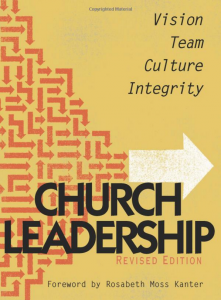
5 Leadership Lessons That Shaped My Ministry by Lovett H. Weems, Jr.
Lovett H. Weems, Jr., founding director of the Lewis Center for Church Leadership, recently shared leadership ideas particularly influential in his own ministry. His top five leadership lessons underscore an approach to leadership that is centered on others and directed toward God's ultimate will, even when the first faithful step is an incremental one.
Lovett H. Weems, Jr., founding director of the Lewis Center for Church Leadership, recently shared leadership ideas particularly influential in his own ministry. His top five leadership lessons underscore an approach to leadership that is centered on others and directed toward God's ultimate will, even when the first faithful step is an incremental one.
I have often said, “I don’t have many good ideas, but I know how to recognize them.” These five leadership principles that have shaped my own ministry demonstrate how indebted my understanding of leadership is to so many others.
1. Leadership Begins with the People God Has Given UsFifty years ago, I heard Martin Niemoeller speak in the Oxnam Chapel of Wesley Theological Seminary. Niemoeller was a contemporary of Dietrich Bonhoeffer and, like Bonhoeffer, was imprisoned by Adolf Hitler. He spent seven years in prison and, unlike Bonhoeffer, lived until the prison was liberated in 1945. It was from Niemoeller that I learned the phrase, “the people God has given us.” That concept has helped me with one of the essential tenets of leadership. Leadership is always about a group and never about the leader. The group may be a ball team, a choir, a congregation, or a nation. For religious leaders, the beginning point is always with “the people God has given us” and not with us.
The question is not so much whether someone is a leader but whether they are “leading” at a particular time. All of us have leadership potential, but it is effective only when leading is taking place.
2. Leadership is Helping God’s People Take the Next Faithful StepScott Cormode, now on the faculty at Fuller Theological Seminary, was teaching at Claremont School of Theology when I first heard his definition of leadership as “helping God’s people take the next faithful step.” Not only does this approach to leadership assume that leadership begins with a group; it also recognizes that leadership is always about change — and is change for theological reasons. The current state of things is never synonymous with God’s ultimate will. No matter how good you feel about your congregation, you surely cannot say, “We are so good that we’ve now become all that God ever intends for us to be.” The unspoken mission of many churches is to “stay as good as we are.” That makes no sense theologically. We cannot become what we need to be by remaining what we are.
Dr. Weems delivered these remarks to a gathering celebrating his tenure as founding director of the Lewis Center for Church Leadership. The event was held on September 28, 2017 at Wesley Theological Seminary in Washington, DC.
3. The Next Faithful Step May Not Be the Next Big StepMy first appointment out of seminary was to an open country church in southwest Mississippi. There I discovered quickly that assumptions we seminary students had discussed a few weeks before might not be accurate. Ideas we assumed had been dead for many years were alive and well. In many places where we might serve, no one had considered that those old ideas might change. If I were going to begin with “the people God has given me,” then this context had to have a claim on me beyond my personal beliefs and preferences. I had to take seriously where I was. Addressing the context where I found myself could have seemed a small thing to the casual observer, but, for me, it was doing exactly what God had called me to do as long as I was pastor there.4. “Leading” May Be a Better Word than “Leadership”People frequently ask me who I see as great leaders. I’m never comfortable with that question because I’m not sure it tells us what we need to know about leadership. For example, in the twentieth century, I think Winston Churchill was in many ways a great leader. But not always. There were times in which he was “leading” and times when he was not. Yet he was the same person. Therefore, the question is not so much whether someone is a leader but whether they are “leading” at a particular time. Similarly, all of us have leadership potential, but it is effective only when leading is taking place. I suggest that you don’t spend time trying to identify a few leaders. Focus on whether everyone is leading appropriately at the moment.
5. In Groups There is More Power for All to HaveToo often we think of organizational power as a limited, fixed sum. We imagine it works like slicing a pie. If someone takes a larger piece, it leaves less for everyone else. When we operate with power seen as a fixed sum, we feel a need to protect our own power. We think the only way for laity to be stronger in a congregation is for the pastor to have less power, and the only way for a pastor to have more power is to constrain the influence of laity.
The reality is just the opposite. In my experience, power within groups is an expandable sum in which the pie itself can get larger. The more willing I am to be influenced by you, the more likely you are to be influenced by me. In a congregation where laity feel most influential, it is not unusual for them to speak often about their pastor’s significant role. By the same token, pastors who exercise strong leadership often are quick to acknowledge the crucial contributions of laity. As each is influenced by the other, they become more open to genuine mutual influence that creates more power for everyone. All are called to be strong together.
Related Resources
- Church Leadership: Vision, Team, Culture, Integrity, Revised Edition (Abingdon Press, 2010) by Lovett H. Weems, Jr.
- Ten Leadership Lessons from Nehemiah by Lovett H. Weems, Jr.
- Leadership is Always about Others by Lovett H. Weems, Jr.

Power Is about Influence, Not Control by Lovett H. Weems, Jr.
Lovett H. Weems, Jr., founding director of the Lewis Center for Church Leadership, draws on the example of Judge Warren K. Urbom's skill in presiding over the Wounded Knee Trials to illustrate an important leadership principle: The more willing we are to be influenced by others, the more likely they are to be influenced by us.
Last July, retired U.S. District Judge Warren K. Urbom died at the age of 91 in Lincoln, Nebraska. I learned from his example one of the most important lessons of leadership. Judge Urbom had a distinguished career as a judge. Appointed in 1970, he served until 1990 and then continued to hear cases as a senior judge until 2014. When he died, former Nebraska governor and senator Bob Kerrey said of him: “No one has sat for more important trials than Judge Warren Urbom. And no one has meted out justice with more wisdom, wit, and seriousness of purpose.”
As Judge Urbom took his place and motioned for people to be seated, his first words were:
As with all leaders, Judge Urbom had to make a choice about how he responded to the first-day incident. He could have insisted on his prerogatives as the judge and forced compliance with the instructions of the bailiff, lest he “lose control of the courtroom.” Instead, Judge Urbom understood how power works in such a setting. Instead of seeing power as a limited sum in which any power he ceded to others would make his power less, he saw power as an expandable sum. The more willing he was to be influenced by others, the more likely they were to be influenced by him. The consideration he gave to the concerns of others did not lead to disrespect. It led to greater honor and influence for him and his office.
Those of us who are leaders in the church are likely to have a more faithful and fruitful season of leadership if we take to heart this lesson about power that Judge Urbom so well illustrated.
This article is taken from remarks by Lovett Weems to a gathering celebrating his tenure as founding director of the Lewis Center for Church Leadership. The event was held on September 28, 2017 at Wesley Theological Seminary in Washington, DC. Watch a video of these remarks.
Related Resources
The Right Question: Leaders do not need answers. Leaders must have the right questions. Finding time for life's priorities is always a challenge. One person uses this question to help make sure there is time for what matters most.
Lovett H. Weems, Jr., founding director of the Lewis Center for Church Leadership, draws on the example of Judge Warren K. Urbom's skill in presiding over the Wounded Knee Trials to illustrate an important leadership principle: The more willing we are to be influenced by others, the more likely they are to be influenced by us.
Last July, retired U.S. District Judge Warren K. Urbom died at the age of 91 in Lincoln, Nebraska. I learned from his example one of the most important lessons of leadership. Judge Urbom had a distinguished career as a judge. Appointed in 1970, he served until 1990 and then continued to hear cases as a senior judge until 2014. When he died, former Nebraska governor and senator Bob Kerrey said of him: “No one has sat for more important trials than Judge Warren Urbom. And no one has meted out justice with more wisdom, wit, and seriousness of purpose.”
Judge Urbom understood that power is an expandable sum. The more willing he was to be influenced by others, the more likely they were to be influenced by him.
Despite having many high-profile cases, perhaps his most challenging trials came early in his judicial career. It was decided that one federal district judge would preside over all the trials of the 150 defendants from the events in 1973 when members of the American Indian Movement occupied Wounded Knee. They stayed for 71 days to protest conditions on the reservation located in southwestern South Dakota. Judge Warren Urbom was named to be that judge.
Judge Urbom was an active United Methodist, and there was intense public interest in these trials, so he invited the United Methodist bishop of Nebraska at the time, Don Holter, to attend the first days of the first trial. It was from Bishop Holter that I first heard this story, though I have heard it told by many others since.
Bishop Holter was there in the packed courtroom filled with both whites and Native Americans, all highly invested in the outcome, though from differing perspectives. In fact, Bishop Holter said the tension in the courtroom was such as to cause concern. In due time, the door opened for the entrance of the judge, and everyone was asked to stand. Bishop Holter reported that immediately all the whites in the courtroom stood, while no Native Americans stood, further increasing the emotions of the whites.As Judge Urbom took his place and motioned for people to be seated, his first words were:
As we begin this trial, there are two announcements I want to make. First, I realize that standing for the entrance of a judge may not be a part of your cultural tradition. If that is the case, I want you to know that I do not take it personally. Second, when witnesses are called to testify, they will be sworn in on a Bible. However, if there is something more sacred to a witness than the Bible, that witness may choose to be sworn in on that object.
Then the trial began and continued without incident during the first day. It was the second day when things changed. Bishop Holter reported that when the judge entered, every single person in the courtroom, white and Native American, immediately stood.As with all leaders, Judge Urbom had to make a choice about how he responded to the first-day incident. He could have insisted on his prerogatives as the judge and forced compliance with the instructions of the bailiff, lest he “lose control of the courtroom.” Instead, Judge Urbom understood how power works in such a setting. Instead of seeing power as a limited sum in which any power he ceded to others would make his power less, he saw power as an expandable sum. The more willing he was to be influenced by others, the more likely they were to be influenced by him. The consideration he gave to the concerns of others did not lead to disrespect. It led to greater honor and influence for him and his office.
Those of us who are leaders in the church are likely to have a more faithful and fruitful season of leadership if we take to heart this lesson about power that Judge Urbom so well illustrated.
This article is taken from remarks by Lovett Weems to a gathering celebrating his tenure as founding director of the Lewis Center for Church Leadership. The event was held on September 28, 2017 at Wesley Theological Seminary in Washington, DC. Watch a video of these remarks.
Related Resources
- Five Leadership Lessons That Shaped My Ministry by Lovett H. Weems, Jr.
- Leadership Lived: Clementa Pinckney and Open Doors by Lovett H. Weems, Jr.
- Leaders Do What Is Needed by Lovett H. Weems, Jr.
The Right Question: Leaders do not need answers. Leaders must have the right questions. Finding time for life's priorities is always a challenge. One person uses this question to help make sure there is time for what matters most.
- To what have I said "no" in order to say "yes" to something more important?

Register Now: "More Church Leaders | Stronger Church Leaders" Conference and Live Stream is Saturday
November 4, 10 a.m.-1 p.m. Eastern
Churches with vital, growing ministries learn to leverage leadership potential within their congregations. At More Church Leaders | Stronger Church Leaders you will learn strategies to identify and support new leaders and build and maintain effective ministry teams. Clergy and lay leaders, in churches both large and small, will discover a more synergistic and fruitful way of being in ministry together.
More Church Leaders | Stronger Church Leaders
Conference and Live Stream by Lewis Center On September 5, 2017
November 4, 10 a.m.-1 p.m. Eastern
Churches with vital, growing ministries learn to leverage leadership potential within their congregations. At More Church Leaders | Stronger Church Leaders you will learn strategies to identify and support new leaders and build and maintain effective ministry teams. Clergy and lay leaders, in churches both large and small, will discover a more synergistic and fruitful way of being in ministry together.
More Church Leaders | Stronger Church Leaders
Conference and Live Stream by Lewis Center On September 5, 2017
Saturday, November 4
10 a.m.-1 p.m. Eastern (9 a.m.-12 p.m. Central)
Wesley Theological Seminary, Washington, DC
Learn strategies to identify and support new leaders and build and maintain effective ministry teams.
Churches with vital, growing ministries learn to leverage leadership potential within their congregations. At More Church Leaders | Stronger Church Leaders clergy and lay leaders, in churches both large and small, will discover a more synergistic and fruitful way of being in ministry together.Topics Include:
- Finding the Leaders Your Church Needs to Thrive
- Simple Strategies for Raising Up New Leaders
- Benefits of the Team Approach to Ministry Leadership
- How to Lead a Team Effectively
- Harnessing the Power of Synergy
Presenters
- Rev. Dr. F. Douglas Powe, Jr., is director of the Lewis Center and holds the James C. Logan Chair in Evangelism (an E. Stanley Jones Professorship) at Wesley Theological Seminary.
- Dr. Ann A. Michel is associate director of the Lewis Center and teaches in the areas of stewardship and leadership.
- Rev. Stephanie Remington is research manager of the Lewis Center and has a rich history of developing leaders for community outreach ministries.
Schedule
9:30–10:00 a.m. Registration for in-person attendees
10:00–10:05 a.m. Welcome and Announcements
10:05–10:20 a.m. Session 1: Introduction
– Finding the Leaders Your Church Needs to Thrive
10:20–11:30 a.m. Session 2: Working with Teams
– Understanding the Dynamics of Effective Teams
– Meeting Management
11:30–11:50 a.m. Break
11:50 a.m.–12:40 p.m. Session 3: Leadership Development
– The Leadership Lifecycle
– Leadership Formation
– Sustaining Leaders
12:40–12:55 p.m. Session 4: Conclusion
– The Power of Synergy
12:55–1 p.m. Closing
Social Media
Attending via Live Stream
Live stream attendees will view the entire conference from their computer or mobile device through a link they receive via email prior to the event. Attendees will receive outlines, written materials, and supplementary materials via email. Live stream attendees may ask questions electronically.Live Stream Registration
Attending in Person
The conference will be held in the Kresge Building at Wesley Theological Seminary, 4500 Massachusetts Avenue, North West, Washington, D.C., United States. Attendees will receive outlines, written materials, and supplementary materials. Coffee and tea will be provided.In-person Conference Registration
Questions?
Please contact Stephanie Remington, research manager of the Lewis Center, at sremington@wesleyseminary.edu or (202) 664-5701.Leadership Development Teams
Learn more and register now.

2017 United Methodist Clergy Well-Being Report Released
Healthy clergy are inextricably linked to vitality in mission and ministry. The Center for Health of Wespath Benefits and Investments has released the 2017 Clergy Well-Being Survey Report with results of its United Methodist Church clergy questionnaire identifying clergy health and well-being trends.
https://www.wespath.org/assets/1/7/5058.pdf?id=li20171101
Healthy clergy are inextricably linked to vitality in mission and ministry. The Center for Health of Wespath Benefits and Investments has released the 2017 Clergy Well-Being Survey Report with results of its United Methodist Church clergy questionnaire identifying clergy health and well-being trends.
https://www.wespath.org/assets/1/7/5058.pdf?id=li20171101
Quotable Leadership: When any organization, including a congregation, becomes more concerned with its existence than its purpose, it has lost its reason for being. (Hayim Herring and Terri Martinson Elton)

Learn 50 Ways to Strengthen Ministry with Children
Jesus said, "Let the children come to me." Learn how your church can demonstrate its love for children and its desire to connect with younger families through effective ministry for and with children.
Read "50 Ways to Strengthen Ministry with Children" now and download free.
Jesus said, "Let the children come to me." Learn how your church can demonstrate its love for children and its desire to connect with younger families through effective ministry for and with children.
50 Ways to Strengthen Ministry with Children by Lewis Center On
Jesus said, “Let the children come to me.” Here are 50 Ways your church can demonstrate its love for children and its desire to connect with younger families through effective ministry for and with children.
Honor the spiritually of children
- Regularly lift up children as persons of worth with a unique place in God’s Kingdom. Scripture teaches that adults should be like children, not that children should be like adults.
- Understand children as participants in ministry, not objects of ministry.
- Teach children to pray. Encourage them to share joys and concerns, participate in prayer chains, and have prayer partners. Have children write devotionals for use at home or in corporate worship.
Demonstrate your congregation’s love and respect for children
- Don’t guess at children’s needs. Listen to children. Solicit input and feedback from children themselves, not just parents and adults leaders.
- Give children real responsibilities.
- Showcase children’s artwork. Hang framed photos of children throughout your building.
- Advocate for children. Hold a children’s Sabbath service that highlights issues concerning children.
- Celebrate the arrival of new babies.
Welcome children in worship and involve them actively
- Always have a creatively presented children’s sermon.
- Include at least one hymn every Sunday that children love and can sing with the congregation.
- Have children serve alongside their parents as greeters and ushers.
- Invite children to assist in worship.
- Design a special weekly service for children or children and families.
- Give small children entering worship a small activity packet with crayons, pipe cleaners, and other items.
- Have a cry room.
- Print a booklet for parents to use in explaining elements of worship to their children.
- Designate special times for children and their families to visit the sanctuary to ask questions and learn the stories behind symbols and stained glass windows.
- Plan special communion services for parents and children to make them comfortable with the ritual. Have “love feasts” in Sunday School classes.
Support families and parents
- Make your space child friendly. Nursery and classrooms should be clean, safe, sanitary and visually appealing to children and their parents.
- Give pagers to parents who leave children in the nursery.
- Host seminars on parenting. Have a Sunday morning class focused on family concerns.
- Sponsor a parent’s night out or morning out.
- Provide childcare for all church events. Don’t just warehouse kids. Make it fun and enriching.
- Give gifts to expectant moms. Offer a support group for new parents.
- Have an annual family retreat or camping trip.
Strive for excellence in Christian Education
- In a congregation with more than one worship time, strive to offer Sunday School in conjunction with all services, including evening or weeknight services.
- Revitalize a tired Sunday School program by adopting a more creative and interactive curriculum. Incorporate music and drama into Christian education.
- Provide early Christian education to infants and toddlers. Explore programs that use special classroom settings, songs, sounds, stories, finger play, and toys to teach even the youngest children about God’s love.
- Encourage teaching teams of adults who rotate classroom responsibilities. This strengthens involvement, improves morale, decreases burn-out, and improves the quality of teaching.
- Hold a training event for teachers at least once a year. Be sure to emphasize the teachers’ spiritual growth and development as well as teaching strategies.
- Communicate regularly with your teachers. Consider gathering them just very briefly at the conclusion of each Sunday School hour to ask “How is it going?”
- Formally recognize and thank teachers each year.
- Work to develop a sense of ownership for children’s Christian education within the congregation as a whole.
- Involve adults who can’t take on teaching in other volunteer roles.
- Pair an adult class or group with each children’s class to forge intergenerational bonds. The adults can provide support and encouragement and help with special activities.
- Perform required background checks for volunteers and staff working with children. Implement policies and procedures to prevent child abuse.
Plan effective special events for children
- Have special children’s events throughout the year, for example, a Noah’s ark costume party, movie nights, seasonal events, etc.
- Hold a yearly vacation Bible school. Explore alternative formats such as a one-day VBS, an evening VBS, or a cooperative VBS with other churches. Or hold VBS at a different time of year, such as a mini-VBS during spring vacation.
- Have a fellowship group for 4th and 5th graders paving the way to youth fellowship.
Reach children and families beyond your church
- Request that parents presenting their children for baptism meet at least twice with the pastor to consider the significance of the sacrament. Form groups for parents whose infants or children are being baptized.
- Give ten nicely printed invitations to the baptismal family so they can invite their friends.
- Use a preschool, day school, or after-school program to build your children’s ministry. Appoint a chaplain. Invite, but don’t pressure, kids and parents to take part in church activities. Look for opportunities to build personal relationships with the families.
- Use VBS as a way to reach out to new families. Follow up with them afterwards, even if it’s something as simple as sending a birthday card to the child.
- Have an outdoor carnival for children in the spring or the fall. A fair can help neighbors know the church is there for them and foster acquaintances.
- Rather than waiting for kids to come to church, take ministry to where kids already are. To attract unchurched kids, consider locating activities in a store front, park, or recreational center. Organize a VBS in an apartment complex or housing development.
- Adopt an elementary school.
- Develop a tutoring or mentoring ministry.
Involve children in mission
- Have each Sunday School class choose a mission project to support on an ongoing basis. Include a mission project as part of VBS.
- Have a mission day camp or a day-long mini-retreat for children with service-learning activities.
- Connect kids with the church’s overall missional efforts. For example, have them help support Volunteers in Mission trips or other ongoing service activities.
- Teach stewardship to children. Involve children in deciding how their offerings will be used. Designate a special project for their support and lift up their stewardship regularly in worship.
 Download a PDF of this page to share with others.
Download a PDF of this page to share with others.
 Learn How to Partner with Your Local Schools
Learn How to Partner with Your Local Schools
Our local schools provide many opportunities for mission within our own neighborhoods, and increasing numbers of churches support their local schools through ministries large and small. If your congregation is considering a school-focused initiative, check out our Engaging Local Schools Tool Kit. Learn more and watch introductory videos now.

Read "Church Leadership" by Lovett H. Weems, Jr.
The need for leadership in the church is pressing, and the need for clear, insightful thinking about leadership is great. In Church Leadership: Vision, Team, Culture, Integrity, author Lovett H. Weems, Jr., draws on the best new ideas and research in organizational leadership, yet always with his trademark theological grounding foremost in mind. Anyone who guides the life of a congregation, be they clergy or laity, will find this book the indispensable tool with which to follow their calling to be a church leader.
Church Leadership: Vision, Team, Culture, Integrity Revised Edition by Lovett H. Weems, Jr. On October 10, 2010
The need for leadership in the church is pressing, and the need for clear, insightful thinking about leadership is great. In Church Leadership: Vision, Team, Culture, Integrity, author Lovett H. Weems, Jr., draws on the best new ideas and research in organizational leadership, yet always with his trademark theological grounding foremost in mind. Anyone who guides the life of a congregation, be they clergy or laity, will find this book the indispensable tool with which to follow their calling to be a church leader.
Church Leadership: Vision, Team, Culture, Integrity Revised Edition by Lovett H. Weems, Jr. On October 10, 2010
 Much has changed since the first edition of Lovett Weems’s seminal work Church Leadership appeared in 1993. But the need for clear, insightful thinking about leadership is just as great as it ever was.
Much has changed since the first edition of Lovett Weems’s seminal work Church Leadership appeared in 1993. But the need for clear, insightful thinking about leadership is just as great as it ever was.
In this revised edition, Weems draws on the best new ideas and research in organizational leadership, yet always with his trademark theological grounding foremost in mind. Anyone who guides the life of a congregation, be they clergy or laity, will find Church Leadership an indispensable tool.
Endorsements
Endorsements
Available from Cokesbury and Amazon
- “Belongs on every pastor’s desk.” (Bishop Rueben Job)
- “An invaluable guide to leadership in the church.” (Rosabeth Moss Kanter, Harvard Business School)
- “The best work I have seen on leadership of religious institutions.” (Burt Nanus, coauthor of the bestseller Leaders)
- “If I had a dear friend just entering parish ministry, I would first give that person a copy of Church Leadership.” (Paul Chaffee, author of Accountable Leadership)
Editor: Dr. Ann A. Michel
Copyright © 2004-2017 Lewis Center for Church Leadership of Wesley Theological Seminary
churchleadership.com/leadingideas
Connect with the Lewis Center:


Lewis Center for Church Leadership
Wesley Theological Seminary
4500 Massachusetts Avenue North West
Washington, D.C. 20016, United States
Copyright © 2004-2017 Lewis Center for Church Leadership of Wesley Theological Seminary
churchleadership.com/leadingideas
Connect with the Lewis Center:


Lewis Center for Church Leadership
Wesley Theological Seminary
4500 Massachusetts Avenue North West
Washington, D.C. 20016, United States
-------






No comments:
Post a Comment